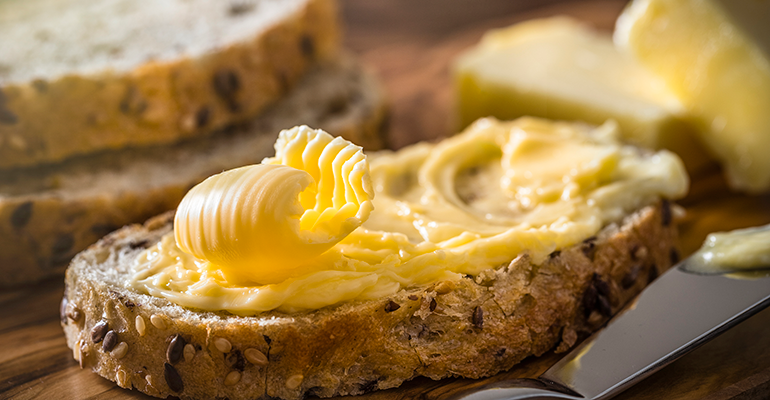News
Churning solutions for the food industry: Food tech startup creates ‘butter’ out of thin air
23 Oct 2024A foodtech startup has detailed an intriguing method to create fats out of carbon dioxide extracted from the air and hydrogen from water, to develop a sustainably produced butter.

Behind this biochemical wizardry is Savor, a Californian-based company that has set its sights on producing high-quality, healthy, and affordable fats and oils without a negative impact on the climate.
“Our process has the potential to produce fats and oils as well as products like butter with dramatically lower land use, water use, and greenhouse gas emissions,” explained Kathleen Alexander, co-founder & CEO at Savor.
“The core of our technology is the thermochemical production of fats from feedstocks containing carbon (such as CO2, CH4, etc.).
“One such fat we can create is our milkfat, which we make into butter by emulsifying the milkfat with water and an emulsifier (e.g. lecithin). We also add salt, colour (e.g. beta carotene), and flavour (e.g. rosemary oil) to finish the butter.”
Bill Gates believes in upcoming alternatives to animal fats and palm oil
The initiative has received some major backing from Bill Gates, who, in his blog earlier this year, highlighted the work Savor was involved in and its efforts in achieving a shared environmental goal of reducing greenhouse gas emissions and the use of hazardous chemicals.
“The focus on animal fats is a priority because they have an outsized impact on climate—and play an outsized role in many beloved foods,” said Gates.
“But even if we could eliminate emissions from the production of all animal fats overnight, we’d still have a challenge.
“Even some plant-based fats and oils can be a problem for climate change. The worst culprit is palm oil,” he added.
The investor and philanthropist went on to highlight that currently, palm oil is the most widely consumed plant-based fat in the world.
“It’s found in half of all packaged goods—everything from peanut butter, cookies, instant ramen, coffee creamer, and frozen dinners to makeup, body wash, toothpaste, laundry detergent, and deodorant to candles, cat food, baby formula, and so much more. It’s even used as a biofuel for diesel engines.”
Fats account for 7% of all greenhouse gas emissions
Savor, a company operating under the umbrella of Orca Sciences, firmly believes that fat production is a real climate problem, which due to the complexities of quantifying its impact on global warming, has meant its exact contribution has proved elusive.
In a recent company post, Alexander proposed a total of >7% of all anthropogenic emissions could be attributed to fat production. These anthropogenic emissions can include the burning of fossil fuels, deforestation, land use and land-use changes, livestock production, fertilisation, waste management, and industrial processes.
“Automotive transportation, steel production, and cement production each contribute about 7%, as well,” she said. “But the environmental impacts of fat production are devastating to a degree that is not fully represented by a number like 7%.
“This is what sets the food system, and fat in particular, apart from other climate problems: if we are successful in commercialising our non-agricultural approach to fat production, we could capture an unprecedented opportunity to preserve existing forests and even rewild historic forestlands. For me, that easily transcends a number like 7%.”
Could consumers be hesitant by the 'lab-made' connotations of the product?
Commenting on the possibility that consumers may be turned off by a product that was not considered 'natural' or 'authentic,' Alexander said: “Our work at Savor is fundamentally about pursuing a future food system that is sustainable, equitable, and delicious.
“Our approach to molecularly constructing fats is truly transformational. However, it is an inescapable truth that our approach is not well-represented by the zeitgeist of the 2020s food system.
“We are excited to share more about our vision and mission and ethics-driven approach to food production as we work towards commercialising our first products.”
Further details about the science behind artificially synthesizing dietary fats were outlined in an Orca Science-authored paper that appeared in the journal Nature Sustainability.
Alongside a team from the University of California, the researchers detailed how their approach could produce a certain amount of lab-grown fats with less than one gram of carbon dioxide emissions per one thousand calories.
This is compared favourably to farm-grown animal fats that create around one to three grams of carbon dioxide emissions per thousand calories.
Related news

Future F&B flavours favour exploration and explosive taste profiles
25 Mar 2025
Exploration and experimentation will define the future of flavour, according to Mintel, as consumers seek out taste profiles and textures that offer an adventurous eating experience.
Read more
US wholesale egg prices plummet, but volatility remains
24 Mar 2025
Egg prices in the US fell sharply in March after supply improved – but risks from avian flu and other market factors keep long-term prices unpredictable.
Read more
Global consumers enjoy food less and perceive it as less healthy
20 Mar 2025
Enjoyment of food and its perceived healthiness is dwindling among most global populations, according to findings from Gallup and Ando Foundation/Nissin Food Products.
Read more
Seafood set to ‘dethrone’ poultry as protein growth king
19 Mar 2025
Seafood is poised to surpass poultry as the leading contributor to global protein supply growth this year, according to Rabobank’s latest protein outlook.
Read more
Scientists reveal new crop production ideas to overcome food shortages
13 Mar 2025
Researchers from the University of Illinois are exploring increasing Rubisco levels to enhance photosynthesis and elevate crop productivity.
Read more
Coca-Cola enters the prebiotic soda category
12 Mar 2025
Coca-Cola is leaning into nostalgia and the growing popularity of “gut-healthy” sodas to launch a line of prebiotic sparkling beverages.
Read more
Tariff volatility leaves food manufacturers in limbo
11 Mar 2025
Rapid US trade policy shifts and tariff escalations are creating uncertainty for food manufacturers and ingredient suppliers.
Read more
‘World's first’ precision nutrition system launched in UK
11 Mar 2025
Wellness provider Reviv Global is claiming a “world first” in the field of personalised health with the UK launch of its 10X Precision Health System.
Read more
‘Health’ labels on products reduce consumers’ willingness to pay
10 Mar 2025
A study into front-of-packaging “health” labelling finds that these labels alone can lower US consumers’ willingness to pay.
Read more
F&B industry hit with fresh greenwashing claims
26 Feb 2025
The food and beverage (F&B) industry is under fresh scrutiny amid claims of greenwashing, with Arla the latest company in the firing line.
Read more